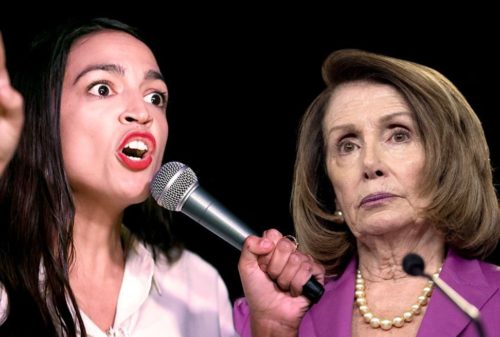Democrats love talking about circular firing squads. It’s their favorite cudgel against the left. But when they find themselves empty-handed (or empty-headed), they use the term ‘purity politics’ instead.
What’s up with this? Who’s using the term ‘purity politics’? Who do they use it against? Why? What’s the function of this term?
Here are some potential answers.
Who’s Using ‘Purity Politics’?
In one sense, it’s easy to say who’s throwing around this label. It’s Democrats. But that’s not specific enough, and I think people miss the implications. The Democratic Party is a diverse coalition, and it’s specific elements of that coalition.
Which elements? The main thing they have in common is that they’re strongly partisan Democrats. They’re the Democrats who ‘vote blue no matter who’. And they often justify this stance using ‘harm arguments‘ that assume Democrats are consistently better for the country. To return for a minute to Nate Silver’s ‘5 Corners‘ typology, Democrats throwing around the term ‘purity politics’ fall into the camp he calls ‘Party Loyalists.’
One issue worth noting is that partisanship is separate from ideology. This is to say that while this group is very Democratic, it’s not necessarily very liberal. Many members are very liberal, but some are more moderate. What they want above all is for Team Blue to win. The means to that victory, and the policy results of that victory, are lesser considerations.
Who Do They Target?
OK, so who do these strong Democrats use the label ‘purity politics’ against. We know Bernie Sanders supporters think they target…Bernie Sanders supporters. And I think that’s largely accurate. But it’s perhaps coincidental.
There are lots of voters out there who are highly ideological, but not very partisan. They’re in many ways the inverse of party loyalists. And to return again to Silver’s typology, they’re The Left and Millennials. To lay down my cards, I’m a member of these groups, and I’m very much a target of the label.
The thing about the political left is we don’t trust the Democratic Party. And that makes sense, because we have no reason to trust the Democratic Party. Many of us vote Democratic only if there’s a good Democrat on the ballot. Racially, these highly ideological non-partisan voters are diverse, despite their reputation for being very white. Many are working-class, and many are Sanders backers.
Hillary Clinton’s not very popular with these groups. And candidates like Joe Biden or Pete Buttigieg are even less popular among them. If the Democrats nominate a Biden or Buttigieg, many members of these groups will either sit out the election or vote third party.
Strategy?
These are the forces strong Democrats fight against with the label ‘purity politics.’ They accuse members of these groups of opposing candidates who don’t fit their high standards. This is a false accusation, given that people who really do demand ‘purity’ would surely demand someone better than Sanders. But that’s the (poorly argued) case the strong Democrats make.
The ostensible strategy is to guilt and sheepdog young people and leftists into voting for candidates they don’t support. And one key problem is that it all depends on the (largely false) assumption that strong Democrats and young people/leftists are on the same ‘team.’ As such, it’s a failed strategy that mostly results in resentment. And so, we have to consider the possibility that Democrats use the label ‘purity politics’ less for reasons of persuasion than reasons of virtue-signaling. They seems to be engaged in a game of displaying alleged moral superiority and high-mindedness.
What’s the Impact?
But that’s enough about intentions. What’s more important is function. Democrats who use the label ‘purity politics’ are performing. But like any other performative, it has certain effects. What are those?
I think the primary impact of the label ‘purity politics’ is to push the Democratic Party further to the right. Central to its use is the attempted silencing of left-wing critics of Democrats like Obama, Clinton, Biden, et al. The partisan Democrats who use it rarely substitute a leftist criticism of their own, thus leaving the left side blocked. Sure, some of these Democrats are very liberal. But they still put partisanship before ideology. And insofar as many are also relatively wealthy white progressives, they’re members of multiple groups known for inaction and/or ineffectiveness.
What’s striking about the 2020 cycle is how early they’re starting this game. They’re already guilting and sheepdogging people into backing Joe Biden, even though he’s not even close to being the nominee at this point. Consequently, they’re not only pushing the Democratic Party to the right. They might also push the Democratic Party to nominate its most conservative presidential candidate in decades.
Pelosi’s Purity Politics
Lots of the problems here involve voters more than politicians. But let’s take about politicians for a bit. It’s hard to find a better example than Nancy Pelosi’s actions as House Speaker. When someone to her left advocates meaningful change, Pelosi bashes the idea like clockwork. When voters advocate ‘democratic socialism,’ Pelosi’s first impulse is to assert ‘we’re capitalists.’ She poo-poos the Green New Deal, single-payer health insurance, and so on.
There are few things in the world I find less interesting than the question of what’s in Nancy Pelosi’s heart. I don’t care, and it doesn’t matter. People can’t eat, live in, democratically control, and receive medical care from Nancy Pelosi’s state of mind. Deep down, maybe Pelosi’s a progressive. Or maybe she’s a communist, conservative, or monarchist. It doesn’t matter.
And so, I don’t care what Pelosi believes. I care what she does. And what she does is promote feckless, gutless, directionless centrism. Why? To win political offices. Where the Democrats…continue promoting feckless, gutless, directionless centrism. “But deep down they’re really a progressive” is nothing more than an excuse for failure.
Thus, the label ‘purity politics’ represents a purity politics of its own.
